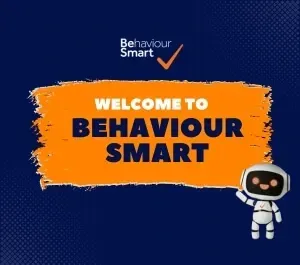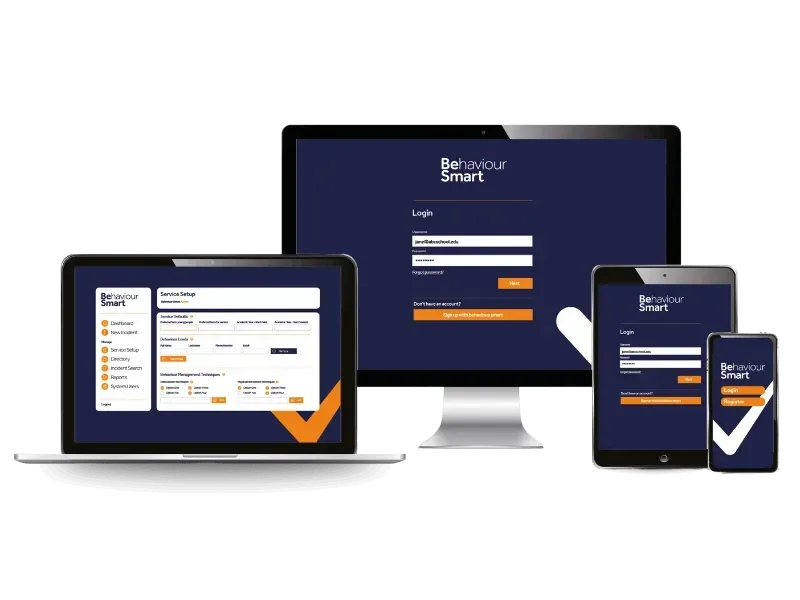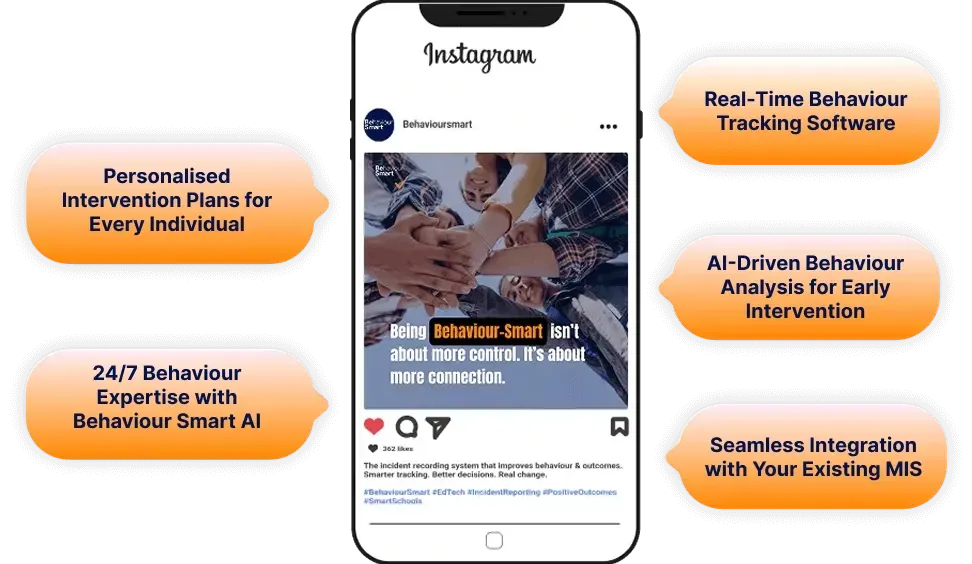
Move away from paper forms and clunky spreadsheets. Behaviour Smart is built with change management at its core, ensuring that transitioning from legacy systems is quick, fully supported, and stress-free for your staff
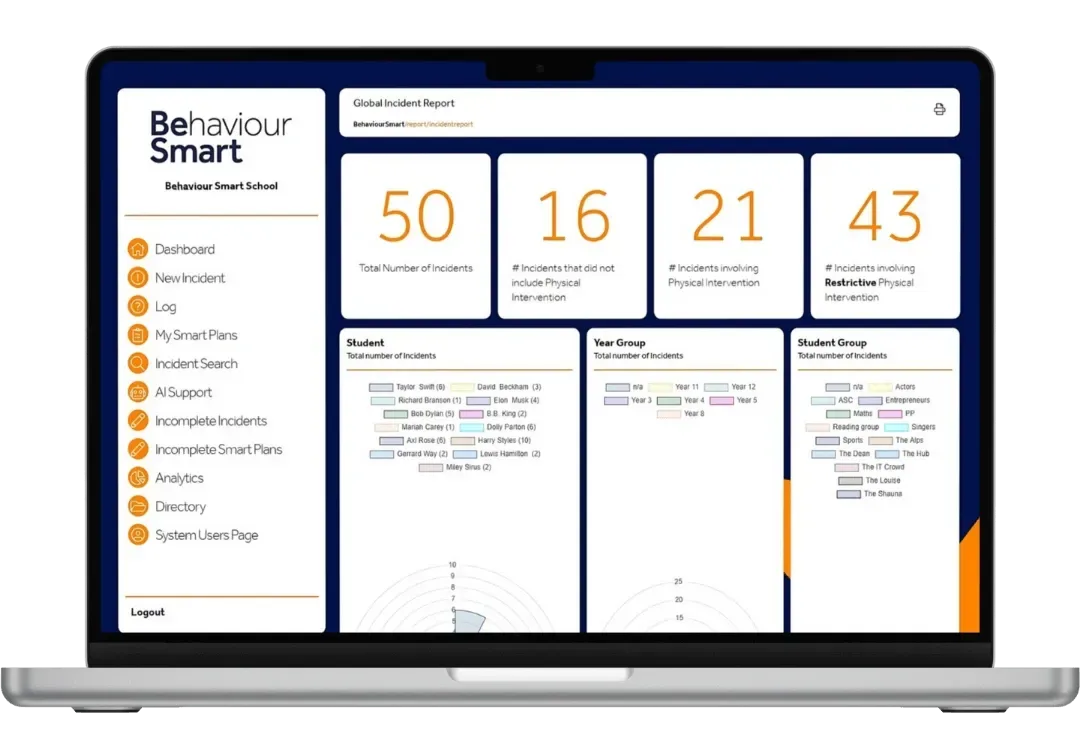
Your All-in-One Behaviour Management System for Schools
Your All-in-One Behaviour Management System for Schools
Smooth transition, minimal disruption. Behaviour Smart is built with change management at its core, ensuring that moving from legacy systems is quick, fully supported, and stress-free for your staff. Our platform empowers schools and children’s homes to turn every recorded incident into meaningful action
Your All-in-One Behaviour Management System for Schools
Smooth transition, minimal disruption. Behaviour Smart is built with change management at its core, so moving from paper or legacy systems is quick, fully supported, and stress-free for your staff.
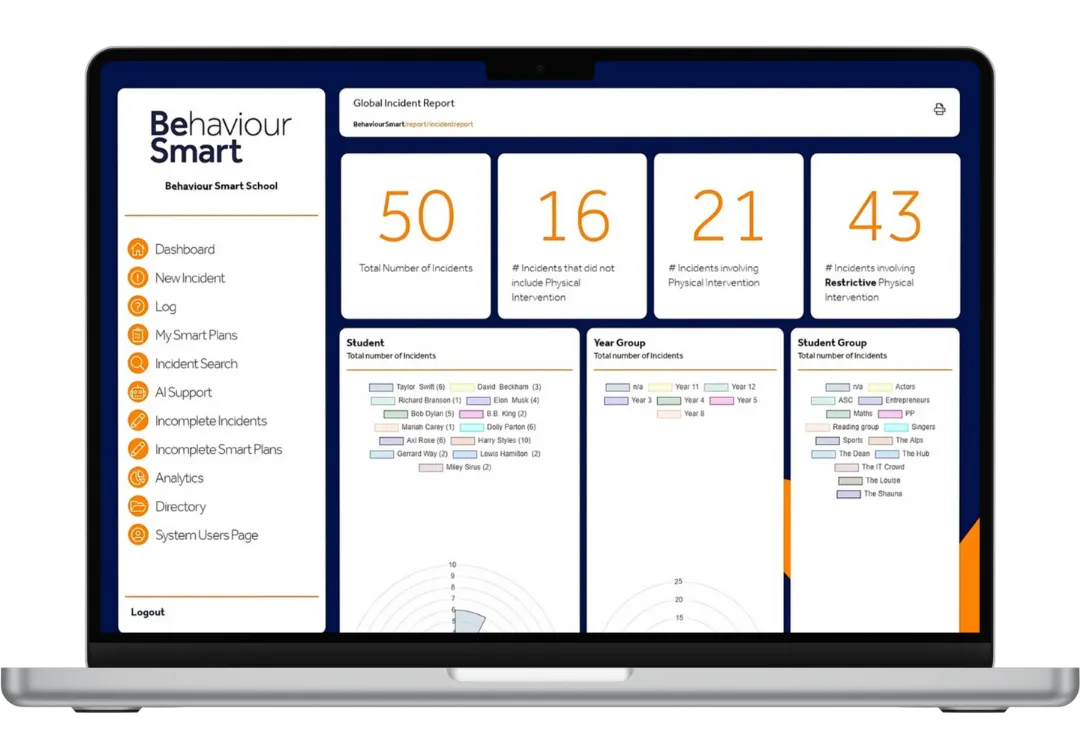
Why Choose Behaviour Smart AI?
Behaviour Smart is not just about collecting data or manually analysing data. Behaviour Smart AI is a powerful tool that empowers schools and children's homes to turn every recorded incident into meaningful action, improving outcomes for students, young people and staff.
Most systems stop at recording behaviour. Behaviour Smart goes further, identifying triggers and providing instant, practical recommendations that make a real difference to student outcomes
Why Choose Behaviour Smart?
Behaviour Smart is not just about collecting data or manually analysing data. Behaviour Smart AI is a powerful tool that empowers schools and children's homes to turn every recorded incident into meaningful action, improving outcomes for students, young people and staff.
Beyond Data Collection: Most systems stop at recording behaviour. Behaviour Smart goes further, analysing patterns, identifying triggers, and providing instant, practical recommendations that make a real difference.
Log incidents instantly from any device and see behaviour data updates across classes, year groups, or key worker groups. Powerful dashboards reveal frequency, location, and time-of-day trends
Our machine-learning models identify emerging behaviour patterns and recommend evidence-based strategies. Proactive alerts help staff act quickly, reducing repeat incidents and improving classroom climate.
Cyber Essentials Certified & GDPR Compliant
We are Cyber Essentials certified, demonstrating our commitment to the UK Government’s cybersecurity controls. Our system is fully GDPR and DPA 2018 compliant, with data protection managed by Veritau as set out in our privacy notice.
The Cyber Essentials scheme outlines a set of baseline technical measures designed to protect organisations, including schools and children’s homes, from common online threats. It helps safeguard the confidentiality, integrity, and availability of sensitive data stored on internet-connected devices.
This certification shows that Behaviour Smart is serious about data protection, online safety, and cyber resilience giving you confidence that your information is secure.
Upon completing an incident report, the platform automatically generates and updates tailored behaviour support plans for each student or young person. These personalised plans equip staff with consistent, effective strategies to manage behaviour and encourage positive change.

Staff can rate the effectiveness of their chosen responses to distressed behaviour. Behaviour Smart then analyses these ratings, providing an independent effectiveness score for each response empowering staff to make evidence-based adjustments.
Connect seamlessly to popular UK MIS platforms via Wonde, keeping behaviour, attendance, and safeguarding data in sync while saving staff time.
Our AI acts as a round-the-clock behaviour expert, delivering real-time feedback on individual incidents, specific individuals, or your entire service. This immediate support helps staff understand behaviour patterns and proactively address emerging issues.
Personalised Intervention Plans for Every Individual
Generate tailored behaviour support plans automatically upon completion of an incident report. Track progress, share goals with parents, and update support strategies with a single click.
Revolutionise Behaviour Tracking with Our AI-Powered System
Revolutionise behaviour tracking with an AI-powered system built for schools, special provisions, and care settings. Log incidents in seconds, identify patterns instantly, and generate SMART behaviour plans strengthening safeguarding, reducing disruption, and providing inspection-ready evidence.
See what clients say about Behaviour Smart’s behavioural science consultancy, training, and solutions.
See Behaviour Smart in Action
Explore the Behaviour Smart dashboard and discover how our AI-powered behaviour management tool helps UK schools track, analyse, and improve student behaviour.
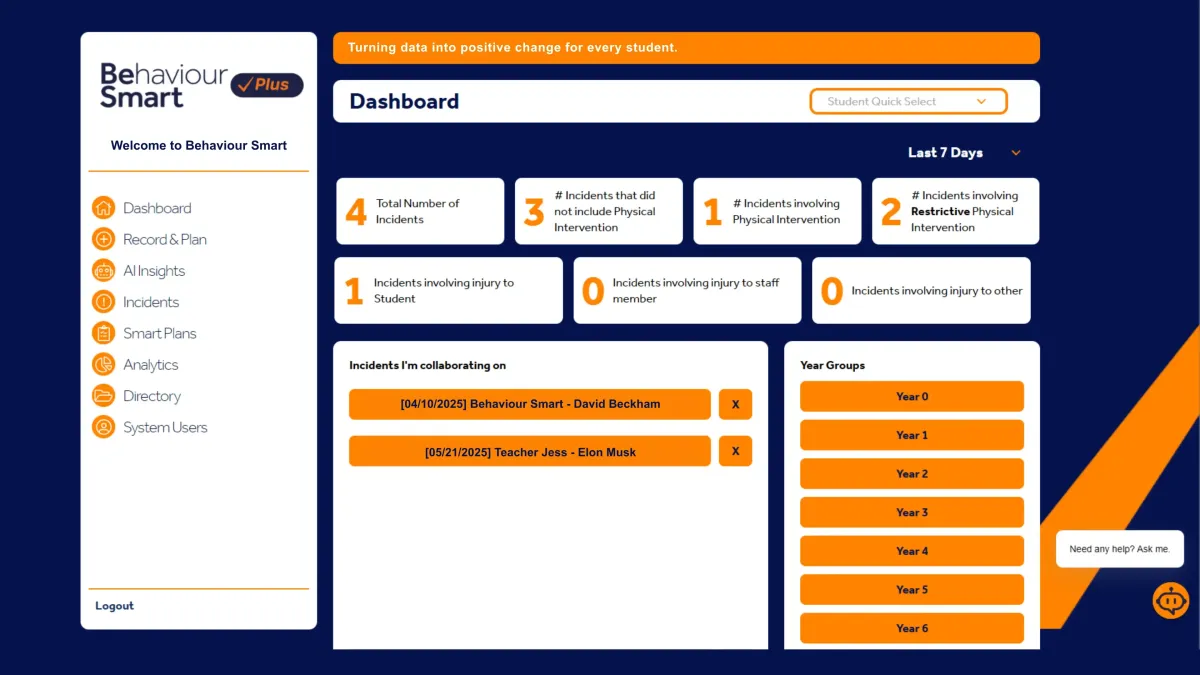
How Does Behaviour Smart Improves Behaviour?
Here’s how our platform makes a difference

When staff complete an incident report, they’re prompted to reflect on the event and consider alternative strategies for future situations. Unsure what to try next time? Behaviour Smart AI is on hand to suggest effective responses, helping staff expand their toolkit.

At Behaviour Smart, we recognise that post-incident learning is key to effective behaviour support. Our structured approach, grounded in extensive research, not only reduces the chance of repeated incidents but also supports sustained, long-term behaviour improvement.

Behaviour Smart offers powerful data analysis and incident search features, enabling schools and children’s homes to identify trends, spot patterns, and make informed, evidence-based decisions that improve outcomes for everyone.

Staff can rate the effectiveness of their chosen responses to distressed behaviour. Behaviour Smart then analyses these ratings, providing an independent effectiveness score for each response, empowering staff to make evidence-based adjustments.
Discover the Behaviour Smart Plan That’s Right for You
A streamlined, AI-powered behaviour recording and tracking system for UK primary and secondary schools, helping staff log incidents quickly and spot patterns that support early intervention. Ideal for mainstream settings that want clear, consistent behaviour data without adding to staff workload.
Built with SEN and SEMH professionals, Behaviour Smart Plus supports complex needs with detailed behaviour analytics, post-incident learning and tools that help teams reduce the need for physical interventions over time. Designed for special schools and alternative provisions that need joined-up behaviour, safeguarding and Smart Plan data in one place.
Trauma-informed behaviour and safeguarding recording for children’s homes and healthcare environments, bringing incidents, risk information and staff reflections into one secure, easy-to-review system. Built to support regulatory compliance, oversight and reflective practice without adding unnecessary paperwork.
What is Behaviour Smart?
Behaviour Smart is an AI-powered incident recording and behaviour management system for UK primary and secondary schools, special provisions, and children’s homes. It helps staff record behavioural incidents quickly, analyse patterns over time, and turn that information into practical, trauma informed support for children and young people.
At its core, Behaviour Smart is an AI-powered incident recording and reporting system that improves behaviour in schools and children's homes by:
• Making incident recording faster, more consistent, and easier to quality assure
• Giving staff real-time behaviour insights so they can spot triggers, patterns and early warning signs
• Supporting post-incident learning and reflective conversations with pupils
• Helping teams develop SMART behaviour plans that are practical, proactive, and regularly reviewed
Behaviour Smart is designed to complement your existing behaviour policy, support your whole-school approach, and align with DfE guidance on behaviour in schools and Keeping Children Safe in Education, including expectations around behaviour, safeguarding and record keeping.
Who is Behaviour Smart for?
Behaviour Smart is built for education and care settings that support children and young people with a wide range of needs, including SEND and SEMH.
It is used by:
• Mainstream primary & secondary schools across Early Years, Primary, Secondary, Post-16 and Further/Higher Education
• Special schools and alternative provisions, including PRUs, independent special schools and APs
• Children’s homes and care settings, such as children’s residential homes, respite care and supported living
The platform supports settings where behaviour is understood as communication of an underlying need, in line with DfE behaviour guidance and statutory safeguarding expectations.
Can Behaviour Smart integrate with our existing Management Information Systems (MIS)?
Yes. Behaviour Smart integrates seamlessly with Management Information Systems (MIS) via Wonde, so your team does not need to manage separate spreadsheets or duplicate data entry.
Through this integration, authorised staff can:
• Pull through accurate pupil, staff and group information directly from your MIS
• Keep class lists, timetables and key demographic information up to date automatically
• Reduce admin time and minimise manual data errors
• Support safeguarding and behaviour monitoring by ensuring incident records are linked to the correct pupils and staff
The integration is designed to respect data minimisation principles and to align with UK data protection legislation (UK GDPR and the Data Protection Act 2018).
What are the key features of Behaviour Smart?
Behaviour Smart brings together behaviour recording, analysis and support into one trauma informed, evidence-informed platform. Key features include:
• Behaviour Smart AI for AI-powered behaviour analysis, giving staff real-time suggestions, prompts and areas to explore
• Fast, structured incident recording and reporting tools for classroom, playground, residential and off-site incidents
• Tools to generate and track SMART behaviour plans and wider behaviour support strategies
• Post-incident learning tools, including structured pupil reflection, debrief prompts and guidance for restorative conversations
• Management Information System (MIS) integration via Wonde, so behaviour and safeguarding records stay in step with pupil data
• Customisable analytics and dashboards for trends, triggers, locations, times of day and impact of interventions
• Access to CPD (Continuous Professional Development) resources, blogs, podcasts and Insights & News related to behaviour, SEND and safeguarding
Is Behaviour Smart secure?
Absolutely. Behaviour Smart has been designed with data protection and safeguarding at its core, so schools, special provisions and children’s homes can record and analyse behaviour with confidence.
We are Cyber Essentials certified, GDPR and DPA 2018 compliant, meeting recognised UK standards for cyber security and information governance in education and care settings.
Behaviour Smart follows the principles set out in our data protection policy, privacy notice and Data Processing Addendum, including lawful processing, data minimisation, secure storage and clear retention periods. These documents explain how we handle personal data, the legal basis for processing and the rights of data subjects.
Data protection and information governance support is provided by Veritau, who specialise in education and public sector data protection, helping us maintain strong, independent oversight of our practices.
Behaviour Smart acts as either a data processor or joint data controller, depending on your chosen configuration and use case. During onboarding, we work with schools and settings to ensure roles, responsibilities and data flows are clearly documented, so your behaviour recording and post-incident learning processes remain fully aligned with your safeguarding and compliance requirements.
Do you offer training for new users?
Yes. We provide onboarding, training and ongoing support for staff using Behaviour Smart, so teams feel confident using the system in real situations.
Most settings receive:
• Live online onboarding sessions tailored to your school, special provision or children’s home
• Scenario-based training on incident recording, post-incident learning, and creating SMART behaviour plans
• Follow-up sessions where needed, including for new staff or colleagues taking on behaviour leadership roles
• Access to our Behaviour Smart Guides, with step-by-step instructions and tutorial videos for Behaviour Smart
Day to day, staff can get help through:
• Online Help pages in our Help Centre, with practical “how to” articles and troubleshooting
• Sophie, our AI bot, who can answer most platform questions instantly and direct you to the right resource
• Human support via email and the option to Raise a Support Ticket for anything that needs a person to investigate
• The ability to Book a technical support session for setup, configuration or more complex queries
Support is calm, non-judgemental and aligned with your behaviour and safeguarding procedures, so the technology genuinely helps your team rather than adding to workload.
How much does Behaviour Smart cost?
Behaviour Smart is designed to be affordable and scalable for different types and sizes of settings.
Pricing is based on:
• The type of setting (mainstream school, special school / AP, children’s home or care provider)
• The number of children or young people you support
• The Behaviour Smart Package that best fits your needs, such as Lite, Plus or Care
This means smaller settings are not charged the same as large organisations, and you only pay for what you actually use.
To get an accurate quote:
1. Review the Behaviour Smart Packages to see which option fits your setting.
2. Let us know whether you are most interested in Behaviour Smart Lite, Behaviour Smart Plus or Behaviour Smart Care.
3. Contact us to discuss your context, existing systems and any specific SEND / SEMH or safeguarding requirements.
We will then send a clear proposal with pricing, onboarding details and next steps.
Are there tutorial videos for Behaviour Smart?
Yes. Every school, special provision and children’s home has access to clear, step-by-step tutorial videos for Behaviour Smart.
You can find these in our Behaviour Smart Guides, which include:
• Short walkthrough videos for recording incidents
• Tutorials on using Behaviour Smart AI to analyse patterns and triggers
• Guides to creating and reviewing SMART behaviour plans
• Help with running post-incident learning conversations using the app
• Tips for using dashboards and reports in team meetings and reviews
All videos are available through the online Help Centre, so staff can revisit them at any time and use them as part of induction or ongoing CPD.

Why Behaviour Smart Is The Best Incident Recording System For Schools
Behaviour Smart is a trauma-informed, AI-powered incident recording system for schools, helping staff spot triggers, refine responses and strengthen safeguarding evidence fast, with Wonde MIS integration and rapid setup.
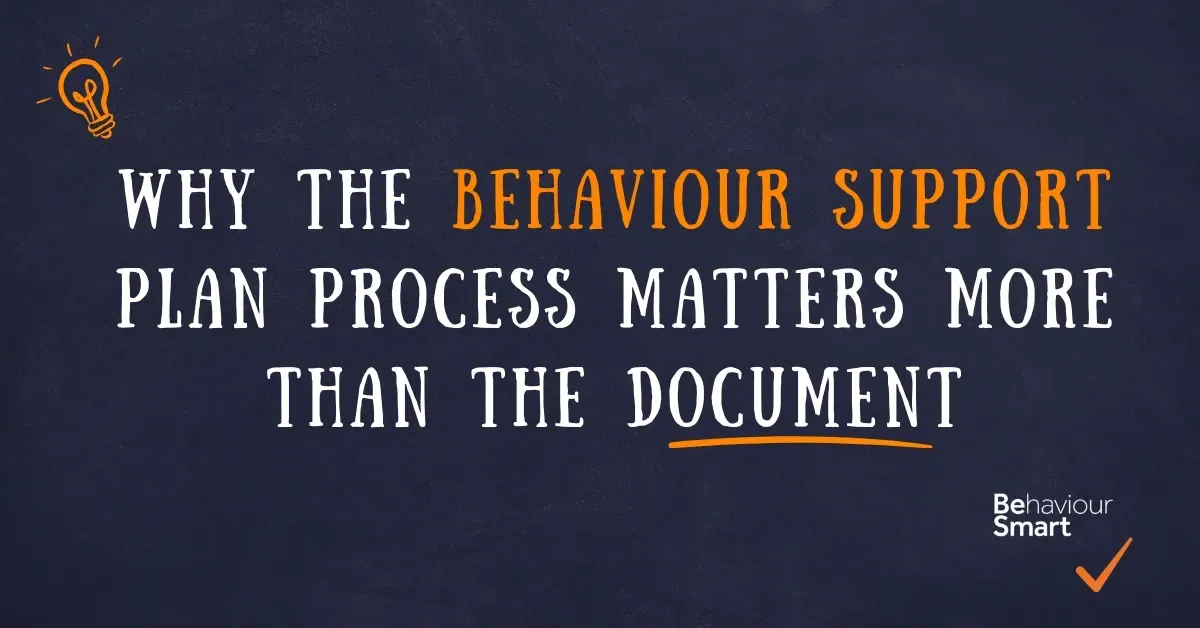
Why the Process of Creating Behaviour Support Plans Matters More Than the Document Itself
Discover why the process of creating Behaviour Support Plans matters more than the document itself. Learn how Behaviour Smart AI empowers UK schools to build effective, inclusive behaviour strategies.

Behaviour Smart at Bett 2026: AI-Powered Behaviour Insights for Schools & Care Settings
Behaviour Smart is exhibiting at Bett 2026, ExCeL London. Discover AI-powered behaviour analytics, Smart Plans and PILD to support SEN & SEMH needs in your setting.
See real‑time results and insights from real practice to real change.
Discover how Behaviour Smart transforms incident data into personalised action, reflection, and effective behaviour plans. Book a free demo now
AI-powered behaviour management and the #1 behaviour tracking app for UK schools.
© Copyright 2019 - 2026 Behaviour Smart Ltd.
All Rights Reserved.



